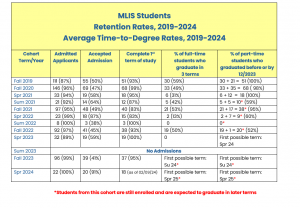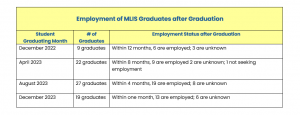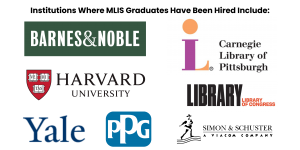The MLIS Program is accredited by the American Library Association
“Assuring quality, innovation, and value in library and information studies education”

The American Library Association (ALA) accredits master’s programs in library and information studies across the United States, Canada, and Puerto Rico. Accreditation is achieved through a review process conducted by an external review panel of practitioners and academics that verifies that the program meets the Standards for Accreditation of Master’s Programs in Library and Information Studies.
Why is accreditation important to our students and alumni?
Graduating from an ALA-accredited program provides flexibility in the types of libraries and positions you can apply for and enhances career mobility. Many employers require an ALA-accredited master’s degree for professional level positions, and some states require an ALA-accredited degree to work as a professional librarian in public or school libraries.” (Source, Office for Accreditation: ALA website)
Is our Master of Library and Information Science degree accredited?
In 2021, the MLIS Program was successfully re-accredited by the American Library Association (ALA) for seven years until 2028. The faculty and staff of the School of Computing and Information are pleased that our highly ranked MLIS program continues to meet the standards for ALA accreditation and provides students with the skills, knowledge, and values necessary for successful careers as information professionals. Since 1924-25 when ALA first began to accredit programs, the Master of Library and Information Science (MLIS) program at the University of Pittsburgh School of Computing and Information has been continuously accredited.
What are the roots of the MLIS degree?
The roots of the MLIS program reach back to 1901 when it opened as the Training School for Children’s Librarians at the Carnegie Library of Pittsburgh. This was the first school in the country to educate librarians to work with children and youth, a signature specialization to this day.
Andrew Carnegie was the program’s first benefactor. The program received its first accreditation in 1926 by the Board of Education for Librarianship of the American Library Association when it was part of the then Carnegie Library School. The Program moved from the Carnegie Library of Pittsburgh to Carnegie Tech in 1930 and began offering a Bachelor of Science degree in Library Science and in 1948 moved to offering the Master of Library Science instead. In 1961, the program was transferred to the University of Pittsburgh via an appropriations bill signed by Governor David L. Lawrence. In 2001, the MLIS program became the first degree program to be offered online at the University of Pittsburgh. Since 2017, the MLIS degree has been offered by the Department of Information Culture and Data Stewardship in the School of the School of Computing and Information.
Graduation and Retention Rates for MLIS Students

Our students pursue their degrees as either full-time or part-time students. About 66% of students are part-time, and .34% are full time students. Full-time students and part-time students complete their degrees in different lengths of time. Full-time students can complete degree requirements in three terms of study. All students have a four-year statute of limitations to complete the degree.
We are proud that 100% of students who completed their first term study between Fall Term 2014 and Fall Term 2018 graduated. On average slightly less than half of students complete the MLIS program in three terms; these are full-time students registered for 12 credits in each of three terms.
Click here for a chart of graduation rates for each cohort of students, Fall Term 2014 through Fall Term 2022.
Click here for a chart of application-to-admission-to-graduation figures that shows the rate of degree completion and terms to complete degrees for each of our student cohorts beginning with the Fall Term 2014 cohort.
Employment Rates of MLIS Graduates

- For those who graduated between August 2018 and April 2019: 53 of 56 graduates are employed (95%). The circumstances of 3 graduates are unknown.
- For those who graduated between August 2019 and April 2020: 16 of 17 graduates are employed (94%). The circumstances of only 1 graduate is unknown.
- For those who graduated between August 2020 and April 2021: 26 of 32 graduates are employed (81%) The circumstances of 6 graduates are unknown.
- For those who graduated in August and December of 2021: 47 of 52 are employed (90%) The circumstances of 5 graduates are unknown.
- For those who graduated in April 2022: 10 of 13 (77%) are employed and the circumstances of 3 are unknown. August 2022: 25 of 32 are employed and the circumstances of 7 are unknown. December 2022: 6 of 9 (66%) are employed and the circumstances of 3 are unknown. Note that 2022 reflects less than a 12-month period and spans the Covid pandemic.

Graduates from 2019 through 2024 are working in 26 states, from Connecticut to California and in five countries abroad.


Click here for a full list of institutions that have hired our graduates between 2019 and 2024.
What are the titles of positions our MLIS graduates have held from 2019 through 2024?
- Academic Institutions
-
- Archivist
- Bibliographic Instruction Librarian
- Cataloging and Metadata Librarian
- Curriculum Center Librarian
- Digital Initiatives and Scholarly Communications Librarian
- Digital Scholarship Assistant Librarian (tenure-track)
- Electronic Thesis and Dissertation Assistant
- Grants and Development Librarian
- Instruction and Electronic Resources Librarian
- Humanities Data Librarian
- Law Librarian
- Metadata and Access Librarian
- Post-Doctoral Fellow
- Preservation and Conservation Librarian
- Research and Instruction Librarian
- Special Projects and Communications Manager
- Technical Services Librarian
- Archives, Museums, Non-Governmental Organizations
-
- Archivist
- Assistant Archivist
- Genealogist
- Process Archivist
- Project Archivist
- Archivist, Kennywood Collection
- August Wilson outreach Curator
- Business/Industry
-
- Archivist
- Digital Asset Coordinator
- Information Specialist
- Marketing Specialist
- Metadata Specialist
- Process Executive
- Procurement Administrator
- Technical Librarian
- Test Engineer
- Government Institutions (Local, State, Federal)
-
- Annotation Analyst
- Conservation Technician
- Crime Analyst
- Head Librarian
- Project Archivist
- Remote Metadata Intern
- Health Sciences Institutions
-
- Interim Executive Director
- Intern (competitively selected)
- Information and Research Services Librarian
- Medical and Health Sciences Librarian
- Outreach, Education, and Communications Librarian
- PubMed Online Content Specialist
- Public Libraries
-
- Adult Services Librarian
- Arts and Enrichment Librarian
- Branch Manager
- Children’s Services Librarian
- Data Intern
- Head, Circulation Services
- Information Literacy Librarian
- Public Services Librarian
- School Liaison Librarian
- Special Projects Librarian
- Technical Services Librarian
- Teen Librarian
- Volunteer Coordinator
- Youth Services Librarian
- Elementary and Secondary Schools
-
- Elementary School Librarian
- K-12 School Librarian
- High School Librarian
- Teacher Librarian
- Self-Employed
-
- Conservationist
- Founding President
- Free-lance Researcher
- Project Archivist
Click here for a full list of position titles arranged by type of institution.
If you would like any additional information regarding student outcome data, please contact Dr. Mary Kay Biagini, Chair of the Department of Information Culture and Data Stewardship.
Please join us for our monthly Information Sessions if you are thinking about a career as an information professional held via Zoom the second Monday of each month from 5:50-6:30 pm Eastern Time.